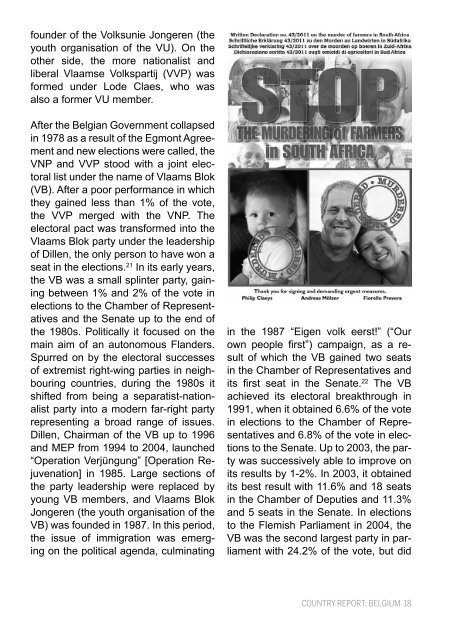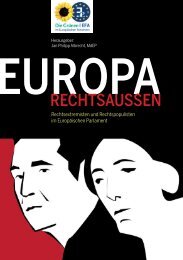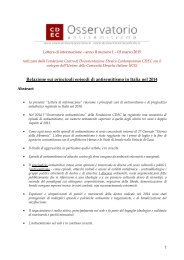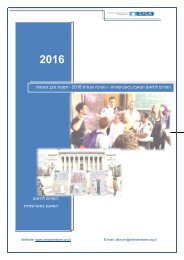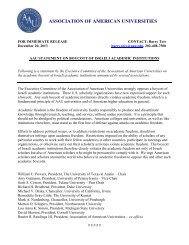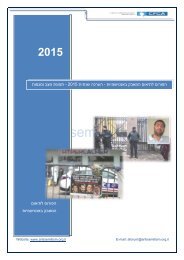692bf7d7d186ed633956d19255d3cf0b
You also want an ePaper? Increase the reach of your titles
YUMPU automatically turns print PDFs into web optimized ePapers that Google loves.
founder of the Volksunie Jongeren (the<br />
youth organisation of the VU). On the<br />
other side, the more nationalist and<br />
liberal Vlaamse Volkspartij (VVP) was<br />
formed under Lode Claes, who was<br />
also a former VU member.<br />
After the Belgian Government collapsed<br />
in 1978 as a result of the Egmont Agreement<br />
and new elections were called, the<br />
VNP and VVP stood with a joint electoral<br />
list under the name of Vlaams Blok<br />
(VB). After a poor performance in which<br />
they gained less than 1% of the vote,<br />
the VVP merged with the VNP. The<br />
electoral pact was transformed into the<br />
Vlaams Blok party under the leadership<br />
of Dillen, the only person to have won a<br />
seat in the elections. 21 In its early years,<br />
the VB was a small splinter party, gaining<br />
between 1% and 2% of the vote in<br />
elections to the Chamber of Representatives<br />
and the Senate up to the end of<br />
the 1980s. Politically it focused on the<br />
main aim of an autonomous Flanders.<br />
Spurred on by the electoral successes<br />
of extremist right-wing parties in neighbouring<br />
countries, during the 1980s it<br />
shifted from being a separatist-nationalist<br />
party into a modern far-right party<br />
representing a broad range of issues.<br />
Dillen, Chairman of the VB up to 1996<br />
and MEP from 1994 to 2004, launched<br />
“Operation Verjüngung” [Operation Rejuvenation]<br />
in 1985. Large sections of<br />
the party leadership were replaced by<br />
young VB members, and Vlaams Blok<br />
Jongeren (the youth organisation of the<br />
VB) was founded in 1987. In this period,<br />
the issue of immigration was emerging<br />
on the political agenda, culminating<br />
in the 1987 “Eigen volk eerst!” (“Our<br />
own people first”) campaign, as a result<br />
of which the VB gained two seats<br />
in the Chamber of Representatives and<br />
its first seat in the Senate. 22 The VB<br />
achieved its electoral breakthrough in<br />
1991, when it obtained 6.6% of the vote<br />
in elections to the Chamber of Representatives<br />
and 6.8% of the vote in elections<br />
to the Senate. Up to 2003, the party<br />
was successively able to improve on<br />
its results by 1-2%. In 2003, it obtained<br />
its best result with 11.6% and 18 seats<br />
in the Chamber of Deputies and 11.3%<br />
and 5 seats in the Senate. In elections<br />
to the Flemish Parliament in 2004, the<br />
VB was the second largest party in parliament<br />
with 24.2% of the vote, but did<br />
not participate in the government due to<br />
a broad containment policy on the part<br />
of other parties. In terms of issues, the<br />
VB represented a strong Flemish ethno-nationalism,<br />
opposed immigration,<br />
preferred a strong state with a hard-line<br />
approach to internal security, and positioned<br />
itself as an anti-party within the<br />
political establishment. 23 For example, a<br />
70-point plan for the (if necessary forcible)<br />
repatriation of immigrants to their<br />
supposed country of origin was drawn<br />
up and presented.<br />
In November 2004 the VB was formally<br />
wound up and a new party, Vlaams Belang,<br />
was founded immediately thereafter.<br />
This was the result of a ruling by<br />
the Belgian Supreme Court which found<br />
that three of the organisations associated<br />
with the party were racist and that<br />
the party had infringed anti-racism legislation.<br />
The Vlaams Blok feared that<br />
it would lose its public subsidies so it<br />
relaunched itself with a watered-down<br />
party manifesto. “Foreigners” would no<br />
longer be deported indiscriminately but<br />
would be able to remain in Belgium if<br />
they were not criminals and were willing<br />
to integrate. The VB leadership nevertheless<br />
made it clear that the party remained<br />
substantially the same, despite<br />
having been reformed. It viewed the ban<br />
as an attack on freedom of opinion. Under<br />
the heading “Trial is Assassination”,<br />
party leader Frank Vanhecke wrote:<br />
“On 9 November [...] it was decided<br />
whether opinions in this country are<br />
still free [...] whether the multicultural<br />
society is truly able to tolerate the<br />
freedom of expression. In the Netherlands,<br />
this freedom is threatened<br />
by religious and political fanatics<br />
carrying revolvers. In our country,<br />
the weapons are for the time being<br />
still in the drawer.” 24<br />
Despite a short-term gain in subsequent<br />
elections, the 2010 results saw<br />
a collapse, with the VB losing around<br />
a third of its voters. The VB is currently<br />
represented in the Chamber of Deputies<br />
with 12 members and in the Senate<br />
with 3 members. The strongest<br />
force in the Chamber of Deputies is the<br />
national-conservative Nieuw-Vlaamse<br />
Alliantie (N-VA,17.4%), followed by the<br />
Wallonian Socialists (PS,13.7 %) and<br />
the Christian-Democratic party Christen-Democratisch<br />
en Vlaams (CD&V,<br />
10.8%). 25<br />
COUNTRY REPORT: BELGIUM 18<br />
19 COUNTRY REPORT: BELGIUM


